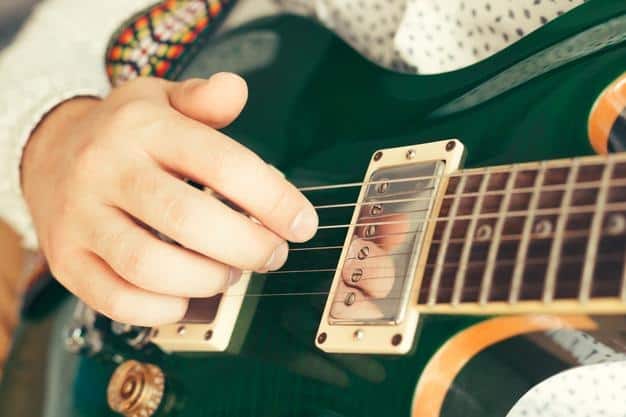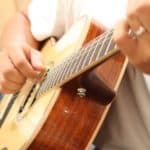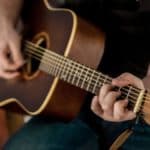If you pay attention, you might notice how certain guitarists have a considerable length of nails.
Why do they do that? That doesn’t look very clean, to be honest.
Believe it or not, having long nails is made on purpose.
That is to say, that they are there for specific reasons.
Guitar players tend to have long nails because of sound and/or style preferences. With long nails, you can get a brighter sound than with short nails. What is more, certain genres will benefit from long nails, such as jazz or flamenco.
Now that you understand the why’s, let’s dive into this topic.
Let’s understand everything from sound differences to alternatives for long nails.
Is it mandatory to let your nails grow for playing guitar?
Having long nails is not compulsory for playing guitar.
Some players do like having long nails.
Some others may prefer playing with their fingertips.
This style provides a mellower sound.
Others simply take a pick and pluck with no fingers at all.
The truth is that the world of guitar playing is too big to focus exclusively on long nails.
Sure, long nails are helpful.
However, short nails cannot stop anybody from grabbing a guitar and playing.
Funnily enough, it is not mandatory even if you are looking to acquire certain sounds that require having long nails.
Want to know why? Then keep on reading!
Why do many guitar players have long nails?
Guitarists tend to have long nails because of sound preferences.
For example, plucking with long nails creates aggressive sounds, similar (but not equal) to the ones created with picks.
Therefore, guitar notes can have more presence than they would if you played with short nails.
Long nails too are convenient for certain styles and techniques.
Jazz, Flamenco, and classical music could benefit from a hand with long nails.
While it seems like a matter of looks, the reality is that long nails make the difference.
Is the difference in sound really noticeable?
There is a great difference between plucking with fingers and plucking with nails.
Using your fingertips get warm and mellow notes.
This is great if you are looking for softer chords, for instance.
On the contrary, using nails to pluck the strings will create sharp, bright, and aggressive sounds.
This difference is relevant because certain styles need either one or the other, as I mentioned before.
Are there any other benefits of having long nails?
Long nails provide certain benefits.
I already talked about sound.
Now, let’s focus on techniques.
Flamenco techniques, for example, require having long nails.
Rasgueados are one of them.
Another benefit is, simply enough, learning more about your guitar.
For example, you shouldn’t have long nails in your fretting hand (more on that later).
Still, if you decide to keep your nails, you can dare to try open tunings.
This is great for discovering new sounds and maybe even finding a new source of inspiration.
Other than that, you won’t find more benefits from having long nails.
Are there any drawbacks of having long nails?
First of all, the main drawback of having long nails is that you’ll have to trade one technique for another.
For example, forget about tapping if your nails are longer than your hair!
It will be almost impossible to tap notes fast and continuously if your nails aren’t short.
Second, long nails shouldn’t be on your fretting hand.
Exception for open tunings, standard chords could be hard to make properly.
Lastly, you may not like having long nails just because of the look.
Long nails are prone to gathering dirt.
While this seems silly, it’s a small detail that could prevent certain people from having long nails.
Should you grow your nails to play guitar?
It is not compulsory to have long nails if you are a guitarist.
The length of your nails will suit the style you want to play.
That is to say, that if your style doesn’t need a hand to have long nails, then don’t grow them.
Put it this way, the sound you want to get will define the length of your nails.
Maybe you like using your fingertips because you prefer mellower sounds.
Maybe you like thicker sounds and prefer long nails.
Or maybe you would prefer to use some of the alternatives that will be mentioned below.
Alternatives to playing with long nails
As I previously mentioned, you can simply use a pick.
Of course, picks don’t produce the exact sound as the one long nails do.
They produce a much more aggressive tone.
This may help for punk or metal genres.
Remember: No nails? Then get a pick.
On the other hand, though, you can always buy nails picks.
Generally made of plastic, nail picks are a kind of ring that resembles long nails.
They come in handy if you want to play certain techniques, such as anything coming from flamenco.
They too are helpful if you are simply looking for experimenting.
Want to know how playing with long nails feel? Don’t want to wait till your nails grow?
Then buy some nail picks! It could change the way you play forever.
Don’t let your fretting hand nails grow!
The fretting hand is the one you use for creating chords.
That hand (could be the right or the left one) should not have long nails.
The reason is that making chords with long nails is a rather difficult task.
For making a chord, one needs to press the strings towards the fretboard.
Long nails prevent the tip of the fingers from properly pushing the strings.
If that happens, then the notes of the chord won’t ring properly.
It’s important to mention that short nails don’t equal no nails.
In other words, be careful and try to have a short but considerable length of nails in your fretting hand.
You don’t want to hurt your fingers while playing.
Conclusion
Now that you know why certain guitarists have long nails, it is your time for making a decision.
If you are unsure whether you’ll be satisfied with the results or not, that’s understandable.
Still, I encourage you to try and see (and listen) for yourself.
If you don’t like it, you can always cut those nails short again.

Hello there, my name is Ramiro and I’ve been playing guitar for almost 20 years. I’m obsessed with everything gear-related and I thought it might be worth sharing it. From guitars, pedals, amps, and synths to studio gear and production tips, I hope you find what I post here useful, and I’ll try my best to keep it entertaining also.





